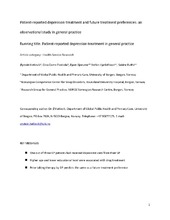Patient-reported depression treatment and future treatment preferences: an observational study in general practice
Hetlevik, Øystein; Garre-Fivelsdal, Gina Dorothea; Bjorvatn, Bjørn; Hjørleifsson, Stefan; Ruths, Sabine
Peer reviewed, Journal article
Accepted version
Permanent lenke
https://hdl.handle.net/1956/22234Utgivelsesdato
2019Metadata
Vis full innførselSamlinger
Sammendrag
Background: Depression is prevalent in general practice, but few studies have explored patient-reported depression care. Aim: To investigate patient-reported treatment received for depression and future treatment preferences among adult patients visiting their GP, and to evaluate the associations with sex, age and educational level. Design and Setting: A cross-sectional survey was conducted in general practices in Norway from 2016 to 2017. Methods: Altogether, 2335 consecutive patients (response rate, 89.2%) in the GPs’ waiting rooms answered a questionnaire about their received depression treatment and treatment preferences in case of future depression. Results: The study population (N = 2239) had a mean age of 48.6 ± 17.7 years (range 18–91), 60.1% were women. Of the 770 patients reporting to have received depression treatment, 39.1% were treated exclusively by their GP while 52.5% also were referred to a psychologist/psychiatrist. Older age was positively associated with medication and negatively associated with referrals to psychologist/psychiatrist. People with high education had lower odds for receiving medication (odds ratios [OR], 0.49; 95% confidence intervals [CI]: 0.30–0.80) compared to those with low education. If future depression, 81.6% of the respondents would discuss this with their GP, 60.9% would prefer talking therapy with their GP, 22.5% medication, and 52.9% referral to psychologist or psychiatrist. Conclusion: One-third of the patients attending their GPs had consulted with them at some time concerning depression the case of future depression, most patients preferred talking therapy with the GP. This finding warrants increased research focus on the GP’s role in depression care.
